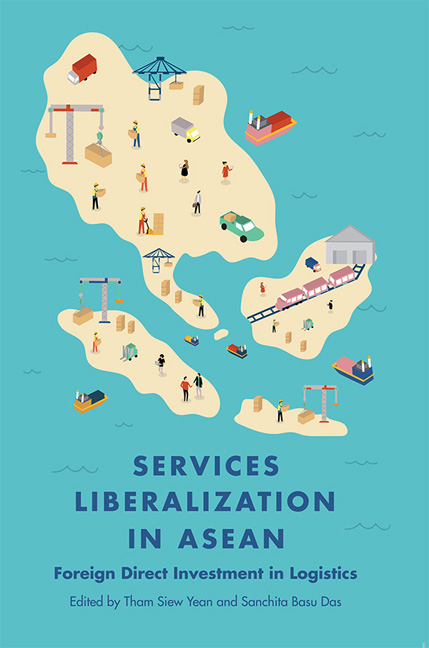Book contents
- Frontmatter
- CONTENTS
- List of Tables
- List of Figures
- Foreword
- Preface
- Acknowledgements
- Abbreviations
- About the Contributors
- 1 Introduction
- 2 Reforming Indonesia's Logistics Sector
- 3 FDI Liberalization in Malaysia's Logistics Services
- 4 Logistics Services Liberalization in the Philippines
- 5 Services Sector Liberalization in Singapore: Case of the Logistics Sector
- 6 Logistics Services Liberalization in Thailand
- 7 Services Liberalization in Vietnam: The Case of FDI in Logistics Sector
- 8 Services Liberalization: Case of Logistics in Brunei
- 9 FDI, Services Liberalization and Logistics Development in Cambodia
- 10 Services Liberalization in Lao PDR: FDI in Logistics Sector of a Land-linked Country
- 11 Facilitating FDI for the Logistics Sector in Myanmar: Agency, Incentives, and Institutions
- Index
7 - Services Liberalization in Vietnam: The Case of FDI in Logistics Sector
Published online by Cambridge University Press: 04 July 2018
- Frontmatter
- CONTENTS
- List of Tables
- List of Figures
- Foreword
- Preface
- Acknowledgements
- Abbreviations
- About the Contributors
- 1 Introduction
- 2 Reforming Indonesia's Logistics Sector
- 3 FDI Liberalization in Malaysia's Logistics Services
- 4 Logistics Services Liberalization in the Philippines
- 5 Services Sector Liberalization in Singapore: Case of the Logistics Sector
- 6 Logistics Services Liberalization in Thailand
- 7 Services Liberalization in Vietnam: The Case of FDI in Logistics Sector
- 8 Services Liberalization: Case of Logistics in Brunei
- 9 FDI, Services Liberalization and Logistics Development in Cambodia
- 10 Services Liberalization in Lao PDR: FDI in Logistics Sector of a Land-linked Country
- 11 Facilitating FDI for the Logistics Sector in Myanmar: Agency, Incentives, and Institutions
- Index
Summary
Introduction
Since the Doi Moi in 1986, Vietnam has been progressively opening up its services sector. In recent years, it has made significant efforts to liberalize the sector by participating in various trade agreements, including bilateral, and multilateral agreements related to trade in service, namely GATS (General Agreement on Trade in Services), AFAS (ASEAN Framework Agreement on Services), different ASEAN+1 FTAs and recently the EU–Vietnam FTA (EVFTA) and Trans-Pacific Partnership (TPP) agreement. In line with its commitments, Vietnam has reviewed, revised and issued numerous legislative regulations and policies towards a freer flow of services. Consequently, the regulatory framework related to the services sector in Vietnam has become more transparent and open to foreign suppliers, enabling them to have better access to its domestic services market.
However, the ease of doing business in Vietnam remains at a relatively low ranking — the 90th among 189 countries (World Bank 2016), partly because the services-related policies are still relatively restrictive towards foreign direct investment (FDI). Therefore, there is a need for Vietnam to evaluate its challenges in services liberalization, especially in the aspect of commercial presence (i.e. mode 3), by examining the impediments to FDI inflows in services so as to enable Vietnam to benefit from ASEAN's initiatives to liberalize services.
This chapter analyses the development and contribution of the services sector to Vietnam's economy. It also discusses services trade liberalization under AFAS and GATS along with the domestic FDI policies in the services sector. The logistic sector was selected as a case study for a deeper analysis of Vietnam's services liberalization. Based on these economy-wide and sector-specific discussions, the chapter will identify key challenges facing Vietnam in attracting FDI into the services sector. The chapter concludes with policy recommendations for Vietnam as well as for ASEAN.
- Type
- Chapter
- Information
- Services Liberalization in ASEANForeign Direct Investment in Logistics, pp. 212 - 241Publisher: ISEAS–Yusof Ishak InstitutePrint publication year: 2017

